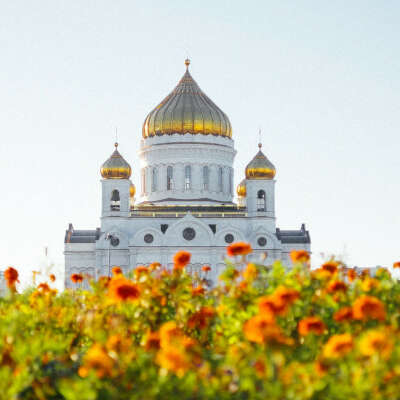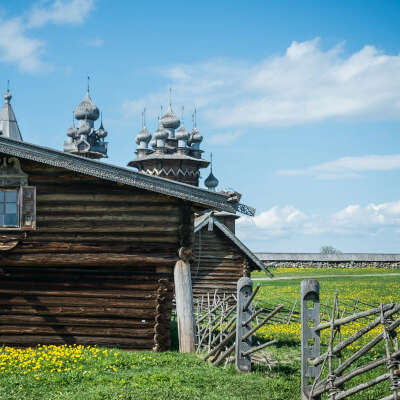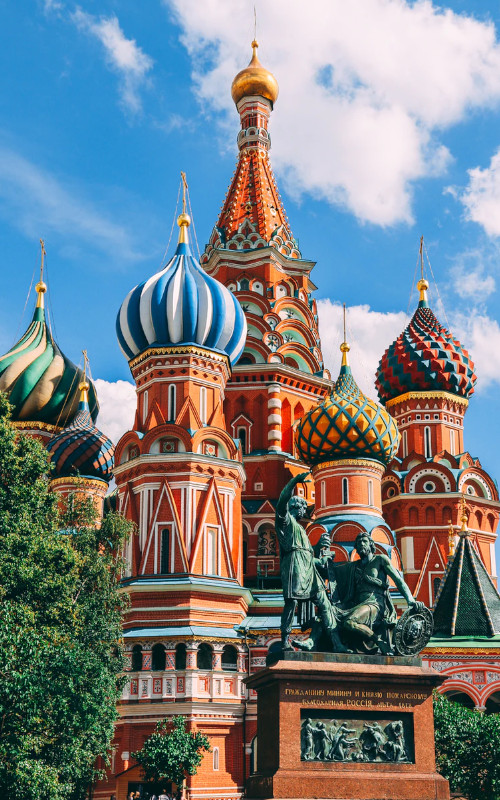So, you want to teach English in Russia? Get ready for one mega adventure. By far the largest country on the globe, this one spans over 10 times zones and stretches from the frozen tundra of Siberia to the balmy coast of the Black Sea, from the edge of Eastern Europe to the very end of Asia. You won’t be short on places to go, people to meet, and food to sample. From the twisted onion domes that rise above Red Square to the craggy tops of the Ural Mountains, there’s oodles and oodles to get through. And we’ve not even mentioned the vodka yet!
But Russia isn’t all plain sailing for the would-be TEFL teacher. Pay rates have a long way to go here before they can compete with neighboring destinations like Estonia or Poland. What’s more, Russia is no stranger to political and social upheavals, and there have been dubious reports on how minorities have been treated in recent years.
This guide will run through all the basics for those who want to teach English in Russia. It’s got info on the sort of pay levels you can expect, suggestions on some of the top destinations (including Moscow and Petersburg, of course), and even an insight into what life is like for a TEFL teacher on the ground…

The TEFL jobs market in Russia
One thing you’ll probably notice right away is that there’s a pretty big generational divide in Russia when it comes to learning English. A lot of younger people are very enthusiastic to get that second lingo going, especially in the bigger cities, where many see Russia as a global and European state first and foremost. There’s not that same demand in lots of rural locations, but that’s as much down to the fact that less people live in, say, Siberia than in Moscow as it is to indifference to language learning generally.
But English skills seem to be becoming more and more important in the land that gave the world Tolstoy and Dostoevsky. Back in 2003, an estimated 16% of people said they spoke or were learning in English. That almost doubled to a whopping 30% by 2015 and the trend is only set to continue. More pointedly, that still leaves 70% of the population – talk about an untapped market!
In addition to all that, Russia’s economy is highly globalized and energy centric. It’s the biggest oil and gas exporter on the planet and reigns over a whopping 30% of the world’s natural resources by some estimations. For would-be teachers, that means business English is a big potential, with earnings that can often outstrip traditional school and young-learner jobs.
- Population: 5 million
- Language(s): Russian, plus 35 other regional languages!
- Currency: Ruble (₽, RUB)
- Capital city: Moscow
- Estimated salary: 43,500-90,000 RUB ($600-1,250)/month
Types of TEFL jobs in Russia
There’s a real range of TEFL jobs up for grabs in Russia. Some are very similar to those on offer in other European destinations. Others are totally different and require a whole different skillset to boot.

- Private language schools – There’s no shortage of privately owned schools that teach English across Russia. Many will never hire native speakers, preferring to hire local Russian bilingual speakers that are generally more affordable. Others will see the benefit of hiring foreign TEFL teachers, as it lets them charge higher rates for courses and adds prestige. There’s often a much more businesslike atmosphere to the language schools in Russia compared to Central and Western Europe, and employee expectations are usually very high. Examples include the BKC in Moscow and English Connection in St Petersburg.
- Business English – Biz Eng is in exceptionally high demand in Russia’s larger cities. But that doesn’t just mean Moscow and SP. It also means gradually industrializing cities like Perm, Voronezh, and Tyumen. Work is usually spread between a number of businesses and requires the teacher to move between multiple places of work throughout the week.
- Au pair – One sort of TEFL job that’s very popular in Russia is an au pair. It’s a combination of a nanny and an English teacher that typically involves living in-house with a Russian family. Employers are usually relatively well-off Russians with busy lifestyles and young children. Pay is high for au pair positions but it’s likely that a TEFL certification on its own won’t be enough – you might also need a separate childcare diploma, a degree, and other professional qualifications.
TEFL teacher salary in Russia
Usually, salaries for English teachers in Russia are pretty modest. They aren’t going to be up there with the big wage packets available in countries like Japan or the UAE. However, that’s offset by a relatively low cost of living, especially if you dodge the big cities of Moscow and Petersburg. What’s more, you can often crank up wages by adding in private tutoring and extra business English sessions on a freelance basis if needed. Finally, there are a select few people who teach English in Russia who can make a lot of money, typically as private live-in teachers for rich individuals, although positions like that are few and far between.
We’d estimate the average wage for a teacher in Russia is between 43,500-90,000 RUB ($600-1,250)/month. Private lessons are charged hourly, usually at between 1,000-4,000 RUB ($13-55)/hour.
Visas for teaching in Russia
You’ll need a Russian working visa to be legally employed to teach English in Russia. The process can take some time but is generally straight forward. It involves an application form with an attached letter of invitation that will be sent to you by your school when a job offer is made. Requirements for the working visa change depending on what nationality you are and what sort of job you’re going to do, but all applicants will need at least a valid passport, a passport-sized photograph, and a HIV/Aids test certificate that’s been completed in the last 90 days.

Requirements to teach English in Russia
Most schools and businesses in Russia are after the prestige of a native speaker first and foremost, so jobs can be tricky to come by if English isn’t your mother tongue. University degrees are also highly prized, while a TEFL qualification (usually a 120-hour one) is a basic minimum for most positions. We’d also say that past business English teaching experience can go a long way in the land of twisted onion domes and vodka.
Term times and working hours in Russia
It’s difficult to say what sort of hours you can expect to work when you teach English in Russia, mainly because business English and private-school schedules vary so much. That said, it’s normal for most to have something in the region of 20-30 hours each week, which can be topped up with private sessions.
Russian schools run from September to June each year, with a two-week break for Christmas and shorter, week-long breaks in the autumn and the spring. Lots of younger English learners will stop their private language tuition between June and August, but there’s a chance you can teach at Russian summer language camps then to keep your work a-rolling.
Cost of living in Russia
Russia isn’t somewhere that will break the bank account. It’s actually got one of the more affordable living costs of anywhere in Europe. What’s more, outgoings are sure to plummet if you move eastwards and away from the larger cities of Moscow and Petersburg.
Rent is likely to be the main expense, but it’s estimated to be over 50% cheaper than in the UK overall. That means a single-room flat costs about 37,123 RUB ($515)/month on average. You can eat out in a midrange restaurant for about 600 RUB ($8.30) per person. Imported beers cost around $2 a pop.
Where to teach English in Russia?
Let’s get one thing straight: Russia is massive. Don’t come here with a TEFL cert thinking it’s possible to experience the place in a single year. Russians themselves often don’t ever manage to make it to even a fraction of their home country. It’s just so big, ranging from the Baltic Sea to the Bering Strait, the Arctic Circle to the edge of the Kazakh steppe. Within are a few destinations that remain super-popular with teachers…
Moscow
Loads of the biggest employers for TEFL teachers in Russia are based in Moscow – from BIS to Simply English. But extensive job opportunities are just a part of the story. The beating, sprawling capital of the country, this one’s packed with bars and restaurants and things to do. Even the Moscow Metro system is considered something not to miss! The main sights are Red Square, St Basil’s Cathedral, and the Kremlin.

St Petersburg
Poets have hailed St Petersburg as the prettiest city on the planet. One glimpse at the grand Winter Palace and the gold-filigreed mansions that line the canals and it’s hard to disagree. Built on a drained swamp at the mouth of the Neva River in the 1700s, it’s one of the great relics of the Russian imperial age. It’s now the nation’s cultural capital, with enthralling draws like the Hermitage Museum and the onion-domed Church of the Saviour on Spilled Blood to get through.
Novosibirsk
Novosibirsk draws TEFL teachers out into the vast West Siberian Plain. There, it straddles the Ob River, offering a pleasant old city center with tree-lined avenues and café-spotted street corners. Novosibirsk is perhaps best known as a pitstop on the Trans-Siberian, the cross-country train line that connects Europe with Asia.
Yekaterinburg
If you’re after a city steeped in rich and mythic history that’s not Petersburg or Moscow, Yekaterinburg might just be the place for you. Head here to teach and you’ll live under the gaze of the gold-topped Church of All Saints – now standing where the infamous Ipatiev House where Russia’s last tsar was executed. And you’ll be on the cusp of the Ural Mountains, too, which roll out northward for hikers and adventurers.
Kazan
Relatively close to Moscow (although relatively still means 12 hours in the bus here!) in southwest Russia, Kazan is the fifth-biggest city in the country by population. It’s a place where east collides with west, and traditions of Europe mingle with historic associations with the Mongol empire. The main thing that stands out is the huge white Kazan Kremlin, a onetime Tatar fort with spiked towers.
Teach English in Russia: Where to begin?
- Get TEFL qualified – A 120-hour course or more is usually what’s needed.
- Reach out to TEFL schools in Russia – Send over a crafted CV and a cover letter.
- Virtual interview – Lots of Russian employers are happy with a virtual interview.
- Apply for visa – A Russian working visa requires that applicants already have a job offer.
- Head to Russia – It’s time to begin!
